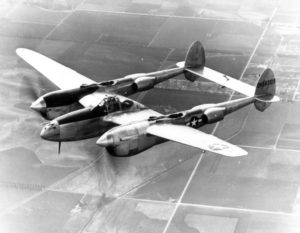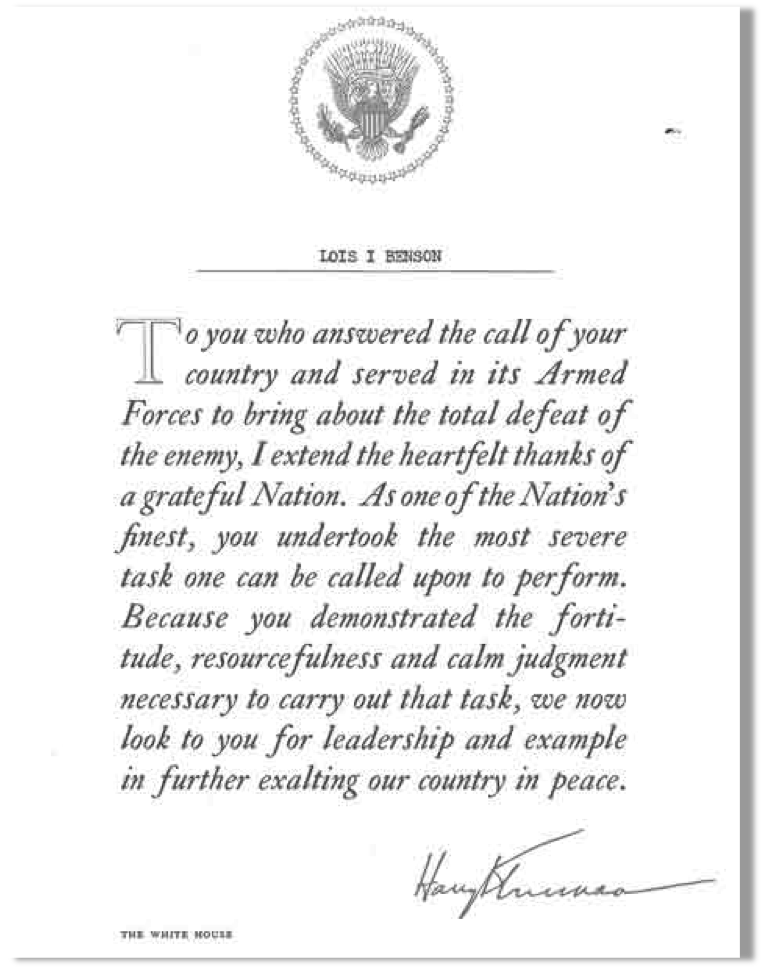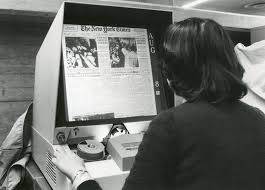
She had a space set up in her family room at the bottom of the stairs. The wood paneled wall behind the table was covered in framed photos of ancestors who had passed long ago. A few documents and an old map hung next to those pictures. A small filing cabinet, two old office chairs, a magnifying glass, and a gooseneck desk lamp, completed the setup. I used to refer to it as “her war room”.I remember feigning interest as she would share what she thought were “interesting stories” about some great, great uncle who had been a horse thief, or a distant relative who had two families at the same time. As a small kid, these stories seemed ….well, to me, they were just plain boring.
As I got a little older, I started to recognize how important our family history was to her, so I started asking more questions. I was still bored by it all, but I must have at least been paying attention because some of those stories stuck with me. Heck, I even remember the surnames she had been researching. Rambo. Blaylock. Benson. Hill. It is amazing what has stuck with me. Even though I didn’t really care about any of it at the time, I loved to hear my grandma tell stories.
The stories that truly captivated me were not “family history” related, but the ones she shared with me about her time in World War II. I no longer had to pretend to be interested, because I was truly enthralled. I loved these stories, and the way she would tell them. We would look through her photos, and boxes of “memories” for hours. To this day, I remember the story behind almost every trinket, medal, document and photo she showed me.
She and my grandfather volunteered at the local genealogical society. On a few occasions, I had the opportunity to tag along. I was much older at this point,, but still valued my time with them. While they painstaking poured over book after book searching for any mention of a “Blaylock” or “Bensons” that had been born, married, or died in Iowa, I was looking for Pearl Harbor or D Day articles on the microfilm reader. I was able to connect with the events in those the articles because of the stories she had told me. My fascination with old newspapers had begun.
I grew up watching my grandma spend HOURS “doing her work”. Her “work” was sitting at a table with our family tree, scrapbooks of old photos, and clippings of old newspapers.
When she passed, my grandfather continued to volunteer at the historical society. He is in his mid-90s now, and no longer spends his time in the archive. I still try to help the society out when I can, (mostly in locating old papers or microfilm). I do so in her memory. My passion for this industry, and history in general, is not because of genealogy, but it was inspired by it.
History is a powerful thing. Seeing it through the eyes of a person who was “there when it happened” connects you to it in a very meaningful way. In her later years, my Grandmother documented some of those stories, which you will find below.
She wrote just like she spoke, and when I read it hear her voice. History can be a very personal thing too:
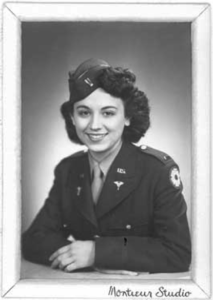
A year as an Army Cadet Corps nurse in 1945
Author: Lois Benson Hill
The last year I was in nurses’ training the government formed the Cadet Corps with student nurses. In return for a very small salary we agreed to stay in nursing for the duration of the war because there was such a shortage of nurses. I decided to go into the army and was on active duty by January, 1945. Fourteen of us from Michael Reese were assigned to Camp McCoy. It was cold and snowy up there. We had a very basic training. We learned to march after a fashion. Most of our marches ended up in snowball fights! We learned how to salute – sort of. And very little else. We were issued our clothing. That came in two sizes – too big and too small. Mine were too big. Other than my dress uniforms, which were tailored to fit, the rest of them were fitted with pins. We signed up for overseas duty at that time. Five of us from Michael Reese stayed together for the duration of our time in service.
We were sent to Camp Barkley, Texas, arriving in an ice storm. Camp Barkley is near Abilene and there we joined the 381st Station Hospital. In that unit were thirty-six women – one chief nurse, one assistant, one nursing supervisor, one OR nurse, two anesthetists, twenty-seven general duty nurses, two Red Cross workers and one dietitian. There were twenty-six male officers. Thirteen were doctors, including the C.O., and 206 enlisted men, making a total of 268 in the unit. We worked on the wards both at Camp McCoy and Camp Barkley, but it was mostly routine nursing. We got some more shots and were issued more clothes. From the clothes they issued we couldn’t tell where we were going. We got wool clothes and mosquito netting. We got long underwear, wool slacks, wool skirts. And things we would need if we went to a warm place. We got gas masks and had gas mask drills. We did more marching. Thirty eight days later we headed for Fort Lawton in Seattle.
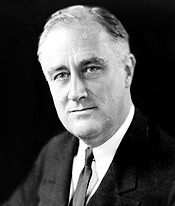
About that time President Roosevelt died and we stood in formation during the funeral in the rain. It was a very uncomfortable experience. On the seventeenth of April, 1945 we boarded ship. The ship was a troop ship and the captain did not want nurses on board. He fought it to the last minute. Imagine thirty-five women on a troop ship! We were confined to a small area. There were certain places on deck we could go. We could go to the ward room to play cards or socialize and we could go to our cabins. I was unfortunate that my name began with “B” as I got stuck with the chief nurse, the anesthetists and all the older girls – they were women to me because I was only twenty-two years old. It was not the most pleasant experience so I did not spend much time in the cabin. I played a lot of cards going over there. And I had a root beer float every afternoon. They opened the canteen and we could get root beer and ice cream. I think that happened every day on the way to Okinawa. We were not allowed to talk to any of the enlisted men.
About every day or so – well, maybe not that often – we had another meeting and we were restricted to a smaller area. We were on board ship for thirty-two days. Hawaii was our first stop, but we didn’t get off. We sat in the harbor and looked at Waikiki Beach and wished we were there. From there we went to Eniwetok in the Marshall Islands. We did get off there. There was nothing there except an officers’ club and a beach. Some of the girls decided they wanted to go swimming, but I was smart and didn’t. They got such terrific sunburn that they had to make a sick bay out of one of the staterooms or cabins. It smelled like vinegar since they wrapped the girls in sheets wrung out in vinegar because they were so badly burned.
As I said, another girl and I were in a cabin with all these older nurses, the dietitian etc. One of our older nurses was rather an odd ball. She loved White Shoulders perfume and had a bad habit of running around the cabin wearing nothing but “White Shoulders.” We had nice looking young Marines guarding us (we were well guarded all the time we were overseas). These Marine guards stood outside our cabin doors so that nobody could come in except the women. There were ten people in a cabin, and they were in and out. Often the doors were opened wide. I fest sorry for the Marine guards, and I was so embarrassed! You can see why I didn’t spend a lot of time in there. At the Eniwetok Officers’ Club I got acquainted with my chief nurse, Captain Georgia Hawkins.

One of the officers the first day he saw her or met her nicknamed her “Sadie” after Sadie Hawkins of the Lil’ Abner cartoon. She was “Sadie” to everybody after that except when the nurses talked to her, and they didn’t dare call her that! Sadie liked to socialize, and she wasn’t a very good example for her nurses. We had quite a time getting her back from the Officers’ Club to the ship. We had a small boat to get us to and from the beach. When we returned we got her into our boat but we weren’t too sure we were going to get her out of it and onto the big ship. But we made it. And it was the same almost every party we went to.
At Eniwetok we joined a convoy. It was an awesome sight to see all those ships out over the ocean as far as you could see. We had several submarine scares although nothing happened that we were aware of. The next stop was Ulithi, and again we did not get off. We stayed there over night and then we went on to Okinawa. We reached Okinawa the nineteenth of May which was thirty-two days from the day we got on board ship. We were about 350 miles from the tip of Japan and about 600 miles from where they dropped the atomic bomb. I figured we went about 3000 miles out of our way to get to Okinawa.
Okinawa is about 60 miles long, 20 miles wide at the widest point and about 2 ½ miles wide at the narrowest point.
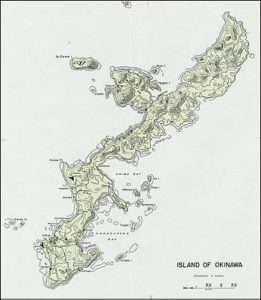
We came in that day behind the ships that were shelling the island. There was a lot of activity in the sky. We began to feel like we finally had found the war. We went further north around the ships and up the coast a little bit and landed there. We were loaded into trucks and taken to the staging area. The only memorable thing about that truck ride was that quite often we would see GI’s running around. They weren’t used to women being on the island and they would be going from the shower to their tents without clothes on. When they saw a truck load of nurses they really scurried! But we sobered up real fast when we came upon a cemetery with rows and rows of white crosses. That really brought home to us what war is all about. When we got to the staging area our quarters were in bean patches. It had rained ten out of the previous thirteen days. It was like being dumped in a cornfield in Iowa during a rainy summer – muddy! We had slacks on but we had just oxford shoes, not high top shoes or anything like that. The second day they issued us combat boots and from then on they were our faithful companions. The mess tent was just a small tent that covered the cooks and the food. We stood out in the rain and ate. The first morning we were there we had pancakes with what they called butter which didn’t melt and syrup and rain and I don’t like pancakes.
I hope nobody will be offended by my talk about the latrines, but they played quite a prominent part in our lives over there. You’ve got to remember, we were living in very primitive conditions. We had tents for shelter, we had no floors, no bathrooms, no running water, and at the staging area we had a slit trench for bathroom facilities. There was a latrine but it was quite a ways away from us. In the middle of the night or late at night in black out conditions in all that mud, and with trigger-happy guards sitting around the perimeter shooting at everything that moved, you didn’t try to get there. You used the slit trench – difficult though it was. We had four days at the staging area and then we were broken up into small groups and sent to various field hospitals. My roommate, the one I ended up rooming with the whole time except on board ship, and two other girls who eventually were our tent mates when we got back to our own hospital, were sent to the 86th Field Hospital.
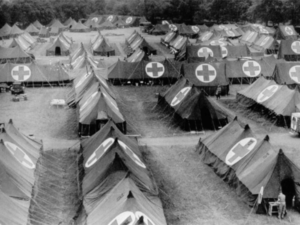
A field hospital is one that takes care of the wounded directly from the front lines. The injured would go to the aid stations and then were sent directly to us. I worked on the chest and belly ward which was for the more serious injuries. We had a lot of abdominal wounds and sucking chest wounds. We did chest aspirations, changed dressings, and everybody got penicillin. The patients were in ward tents. Cots were used for beds. Very, very primitive conditions. Mud floors. The surgery was right next door and across the way was the place where they first brought the men to get them prepared for surgery or to wait for surgery. Most of those patients were seriously injured. There were a few, however, that were not so seriously wounded. They were ones that kept things hopping around there. The rest of them were just a little too sick. They were all excellent patients. They thought the patient in the next bed was sicker than they were. Take care of them first! We kept them there until they were able to be transferred back by ship of by plane to Guam or Hawaii and then back to the states unless they were going to go back on duty. The reason I said there were a few who weren’t so seriously ill is that I have some letters from a couple of very young soldiers which they wrote to me after they left the hospital. They both said they fell in love with me and they wanted to marry me. I can remember one – the other one I can’t. I was only twenty-two years old and they seemed like they were about fifteen, so you know they were very immature boys. The conditions at the hospital were miserable and we worked awfully hard. We bent over those cots all day and night. When we first got there we thought the nurses looked awfully tough – the ones who were already in the hospital. But after a while we decided that they were just completely exhausted. They had been there probably a month before we arrived and they were just plain worn out. Within a month we looked the same way. This is where another latrine story comes in. The only place we could find for a back rest was in the latrine. We used to go there and sit just to rest our backs because we only had a bed to sit on and that didn’t help your back any. That’s the reason I have back trouble – or so I say!
Our tents and living quarters were even worse. Evidently they didn’t have facilities for the four of us with the other nurses because I don’t remember any other tents around us. We were located partly up a hill with a path leading down to the hospital. The officers’ tents were above us with another path leading to their tents. When it rained the water came down that path and right through our tent. We had a regular river in our tent. Our beds sat on boards so they didn’t sink completely out of sight. Our combat boots were also placed on boards to keep them from floating away in the middle of the night. We slept on our clothes to get them dry. We carried our own water. We tried to carry it up that slope (in five gallon cans). It took two of us. We did an awful lot of slipping and sliding and giggling trying to get those water cans up to where we could use them. That was our only source of water. It was our drinking water, our bathing water, our laundry water. We made do with very little. I don’t remember ever taking a shower while we were there. I don’t know whether they even had showers there. [The male officers built one on the opposite side of the hill near the top.] Most of the time we bathed out of a helmet. Because we had such a hard time getting water we would soak our muddy clothes in our bath water so we could get the mud out of them, and then we would wash them in a little clearer water.
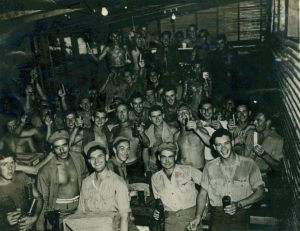
One night some of the officers (four of them probably) invited four of us up to their tent for a drink. Suddenly, while we were looking at pictures and talking, the lights went out – it was a blackout. A blackout on Okinawa was black! My roommate (we called her “Frog”) said, “Benny, I’m leaving.” I said, “Wait for me,” and we took off in the rain, in the mud, in the blackout. We went down that hill and slid into our tent! Frog wanted out of there, so we left.
One time another outfit wanted to have a dance. They had put down a wooden floor and sent over a truck. We all got on the truck and went over to their place for drinks and a dance. And that was the extent of our social life when we were at the field hospital!
There were quite a few air raids while we were there. There was also a lot of shooting. Remember this was only four and half miles to five miles from the front lines where there was heavy fighting around Naha and Yonboru and Shuri. We also heard shooting closer by. We were told it was because the Japanese were trying to infiltrate our camp. I suppose they were looking for supplies, food, and medicines. I never really knew whether they caught any or not until one day I went to work and saw two dead Japanese lying on the ground. They had gotten awfully close because they were between our tent and the wards.
We ran out of clothes and everything else and we kept sending word back to our outfit that we wanted our foot lockers. We lived in just what we could carry on our backs. We were told they had been sent about a week ago. We finally found them in a tent buried in the med. My foot locker never recovered! It is still musty.
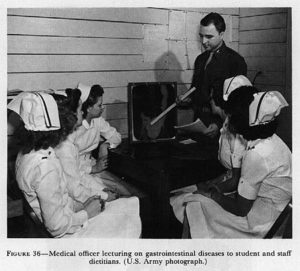
After about one month we went back to the 381st Station Hospital which was between the Yonton and Kadena airstrips. A station hospital normally takes care of the people that are on the island – the service people, the back- up crews for all the combat troops. But when we first got back there we worked as an evacuation hospital. The patients came from the field hospitals. We kept them until they were discharged or facilities were available to get them off the island. By the time we got back to the 381st they had set up our camp. Our nursing quarters were in a compound and we were practically like prisoners of war. There were nine tents surrounded by a fence of barbed wire and burlap. In front of the entrance was another area that was surrounded by a fence. By that entrance there was a guard. We always had an armed guard there. In the back of the compound there was another area for our latrine. This was somewhat separated from the rest of the living area. One night I was back there by myself after dark and I saw a shadow go by. When I got back in into the compound we found that somebody had come in through a hole which had been made in the fence. He was ransacking one of the nurses’ tents. It was an American soldier; not a Japanese. We had that problem because there were so few of us on the island.
Going from the field hospital to a station hospital was just like going from a shack to a palace as far as we were concerned. Our tents were still tents in a way, but we had wooden floors. Those were raised up off the ground and then it was built up about three feet from the floor with wood and screened up to the ceiling. The ceiling was a tent with flaps to come down and cover the screened area. We also had a door and our water was brought to us so we didn’t have to be quite so stingy using it. We still did not have running water or anything we could wash in other than our helmets. We still used those but I think we had some buckets by that time we could do our laundry in. We did have showers but they were across the hospital area, not anywhere near our tents, and there were only certain hours when we could use them because they were community showers and everybody used them at certain times. There was a floor in the shower tent, and there was siding around it. I’m not too sure whether it was wooden or canvas. The tip was open. We had a lot of slow moving planes up there for a while until we complained and then they moved on! We had to keep regular hours and we had a curfew – we had to be in at certain times. We were not allowed to leave the area unless there were two of us accompanied by two armed officers.
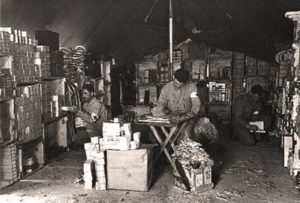
Our hospital units (in the field hospital, too) were tents – big tents, not just a tent with five or six beds in it; there was probably room for fifteen to twenty or twenty-five patients in these tents. The floors were dirt. Somebody with infinite wisdom had decided to put rock in there because they thought it would dry up the mud and it would be a little cleaner, but the rocks they put in were huge and you almost broke your ankles just trying to walk across it. So we spent two or three days just picking up the big rocks and chucking them under the beds or out around the edge of the tent. My ward was an evacuation ward completely. Most of my patients were bed patients. They were paraplegics, amputees, body casts, and very few walking wounded. We kept them, as I said, until there was a plane or a ship that could take them back to Guam or Hawaii. Once we had an alert for a paratrooper attack and they told us to make sure that our patients were moved to a safe place. Well, there was no way that we could move those patients in their body casts, paraplegics, etc. So we decided we would protect them as much as we could. The boys were armed. They normally weren’t armed but at this particular time for two or three days they were. The story was also going around that they were saving one bullet for the nurses – they didn’t want us to be captured. There were such horrible stories about Japanese prisoners! The ward tent was a double tent, which meant it had two peaks and sunk down in the middle. It kept sinking. We were having so many rain storms I suppose it was water logged and stretched a little bit and the ropes came loose, but this one particular day we watched as it sank further and further down and the boys tried to push the rain out of it. They got inside and shoved the water up but it didn’t help much. We thought the whole tent was going to come down because it was full of water. So one of my ward boys just decided to take a knife and slit it. We had running water finally! One of the patients who was in a bed right next to where the water was rushing through the vent decided to take advantage of the water and he shaved himself.
The island was becoming secure by the end of June. There were just mopping up operations and we were less and less busy. Work wasn’t really that hard back at the 381st and about that time they dropped the atomic bomb. Then a few days later the Japanese surrendered and it was bedlam on Okinawa! It was worse than any Fourth of July you ever saw. I think every gun on the island went off. There wasn’t an outfit in place that wasn’t firing. Falling shrapnel penetrated tents and even some of our troops were killed. But we were out there without helmets – we celebrated! It was a wild, wild time. The sky was just completely lit up.
After that things were quiet until the typhoons hit Okinawa. The first typhoon came in September. It didn’t do too much damage to us but I guess on the coast there were some ships that were damaged. The second typhoon, in October, was really a bad one. I was off duty at the time. I worked nights and I was not feeling well. My tent mates were on duty and they evacuated all our patients. We had two buildings. One was the wooden mess hall, one was the psychiatric ward, a Quonset hut. They were working on another Quonset. It wasn’t completed, but we did take shelter in it. I spent the day, instead of sleeping, trying to hold our tent down. I was out every ten or fifteen minutes trying to tie it down a little tighter so that the top didn’t blow off. Finally we decided we had to evacuate the tents and go to the Quonset, so I made three trips over to the Quonset.
The first two times I carried blankets and pillows for my roommates and myself. The third time I went back and got our dog – we had a puppy – his name was “Perky” – and took him back. By that time the wind was so strong I could not walk by myself. Besides, I was not feeling very well. Two officers literally pushed me against that wind over to the Quonset. I got over there and just sat in a daze. By that time I was so worn out and feeling so badly that they took one look at me and put me over in the psychiatric ward for the night. The patients were wandering around all night long and I didn’t get much sleep, but nobody else did either. A few came into the room but the ward boys would catch them before they did any harm.
The winds were 132 miles an hour and when we got up in the morning there wasn’t a tent standing. Our hospital was flattened. My living quarters tent held up pretty well on three corners, but guess whose corner didn’t hold up? Mine. My mattress was wet and I had a beautiful white navy blanket that was beyond repair. My cupboard had tipped over and every piece of clothing I had was wet. The only thing that was dry was what I had on. We stayed in the tents, as far as our quarters were concerned, but we didn’t have hot food for three or four days – that means we had K rations and C rations.
Somebody had sent one of the girls a ham, and we had ham and crackers. It was probably four days before we had a meal actually prepared for us. They shipped us food. We heard we were getting fresh milk, but it was frozen. If you have ever had milk that isn’t pasteurized you know the cream comes to the top. And here were these big hunks of cream and I was looking forward to my milk. They did send us some fresh food and that was probably the first and last time we had fresh food.
They rebuilt some of the ward tents but not mine. We no longer needed to act as an evacuation hospital. They had evacuated all the patients off the island before the typhoon hit. I moved to a surgical tent. From then on our work was just general duty nursing. The only other emergency was a plane crash right near our outfit. We got those patients.
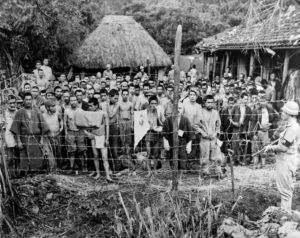
One time before we went into the Quonsets we got a group of prisoners of war – American prisoners of war who had been held by the Japanese. They were a sorry sight. They were skin and bones, so weak they could hardly hold their heads up. We had quite a problem with the other patients in the ward because they felt like they should give them their food. Our patients would go without so these fellows could have their food. But they weren’t allowed to do that because the former prisoners were on a very strict bland diet in small amounts until their stomachs could start tolerating the food again. Unfortunately, about that time some P–38 pilots who were friends of ours got their orders to go home and they decided to buzz the hospital to tell us goodbye. They got in a little bit of trouble. They weren’t too sure they were going to get off the island for awhile because their buzzing scared the patients. These prisoners of war just cringed when those planes came over.
Eventually we moved into Quonsets and we finally got running water, flush toilets, and a place to do our laundry. Two to a room and it was wonderful. My roommate Frog (Jean Demars) was a long legged gal from Montana. She was absolutely fearless. She got me into more trouble! I was in more danger from what she got me into than I was from the Japanese! We couldn’t go anywhere unless we were in twos. So she’d come home and say, “Benny, I’ve got a date and you have to go with me.” So off we’d go. We ended up in the harbor one time. She was driving a duck – we were going out to a merchant marine ship. She had met the merchant marine captain someplace and he had invited us out for lunch. They came to get us in a duck. She decided to drive out in the middle of the harbor. Here she was, driving among all those ships. Later we had a nice visit and a good lunch.
Another time she met some C-47 pilots. They sprayed the island for mosquitoes. So when we had mosquitoes, we’d call them and they would come to spray our area for us. We also got to ride in a C-47. We wend hedge-hopping all over the island. I was scared to death. She met some P-38 pilots. They were in a reconnaissance group and they took pictures of the front lines and the fighting that was going on over there. These were one-pilot planes – you could only get one person in them – except the one they had rigged up so you could put another person in the back of the pilot. I went for a P-38 ride and ended up flying upside down! I have never been in a conventional airplane, but I’ve been in C-47 and a P-38!
Another time Frog got me involved in a date with an enlisted man. Enlisted men were taboo. We could not fraternize with them. We were only allowed to date the officers. But somehow or other she got us into this. So we took off and went swimming. When we got there they pulled the Jeep off the road and down around the rocks on to the beach. In the meantime the tide came up, and the Jeep was marooned. We couldn’t get back and we had to be on duty. So we went up to the road and thumbed a ride. Fortunately a Jeep came along. It was the General’s Jeep. The driver kindly picked us up and took us home. So we got back to our outfit in time to go on duty.
We were like sisters to a lot of the enlisted men and even some of the officers. We heard all of their stories about the girl friends that had dumped them and all the problems that were going on at home and what have you.
One of our nurses was killed. She was in a Jeep and at an intersection they met a duck coming. It went over the top of the Jeep and killed her. So we had a funeral over there and she was buried there. Later she was brought home and buried in Chicago.
Coming home was a different story than going over. We practically had the run of the ship. We ate with the Navy. They treated us royally. It took us eighteen days to get back, but the weather was terrible. We didn’t know whether the ship was going to hold up until we got home. We had concerts. A couple of the nurses sang and they had a band that performed. And we really had a good time coming back. We anchored just before we got to the Golden Gate Bridge and spent a night gazing at the lights of the United States again. By the next morning I was almost sick I was so excited!
It was a short year in my life. But I’ll never forget it and never regret it!

